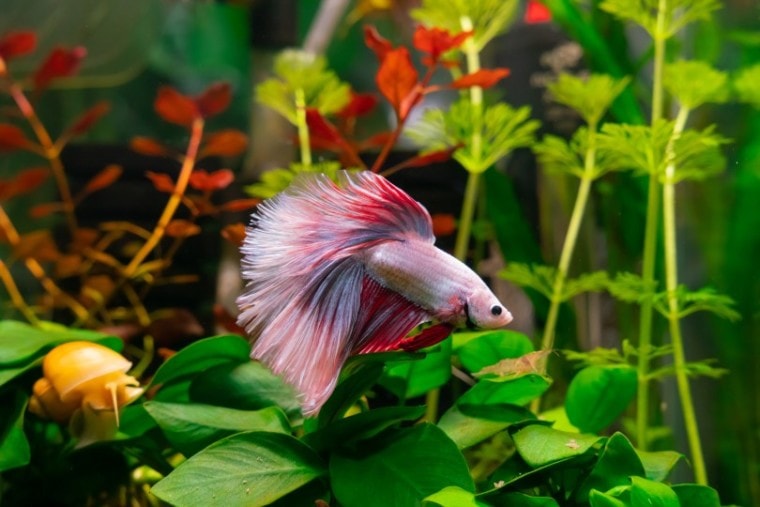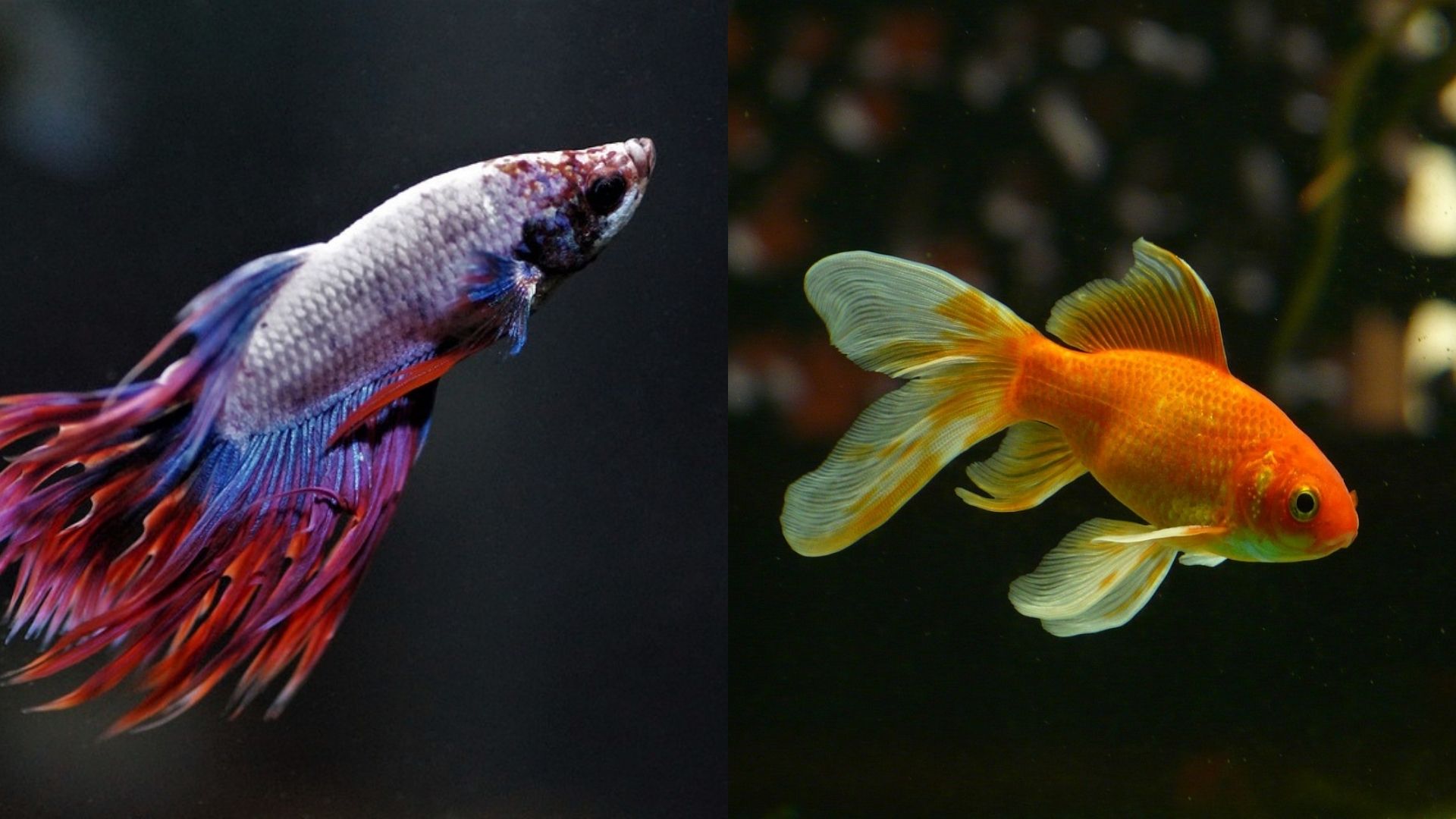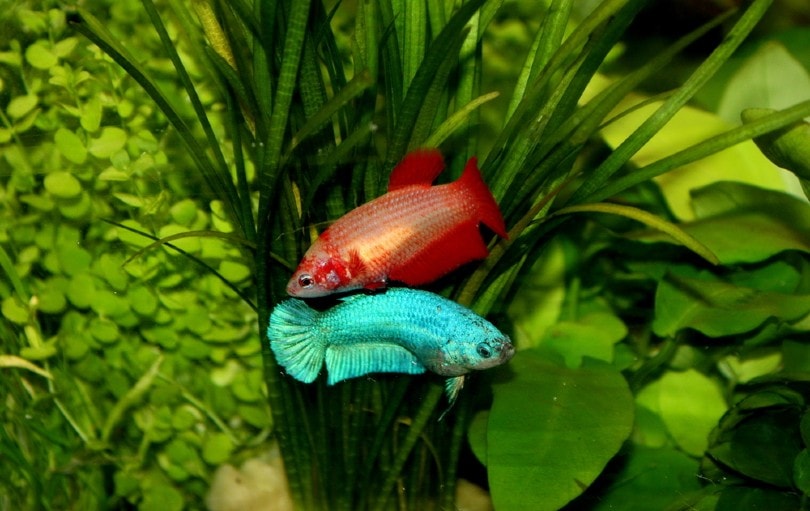
Betta fish, better known as Siamese Fighting Fish, are beautiful, mysterious creatures that have fascinated aquarium keepers for decades and are one of the most popular pet fish for aquarium enthusiasts. With this popularity has come tons of development of morphs and colors. There are over 70 recognized Betta morphs around today, with that number growing every year!
The Pink Betta is just one of these morphs. They exist only in captivity and have been created through years of careful development. These fish are rare and difficult to come by. To confuse matters more, plenty of fish are sold as Pink Bettas but are not truly, genetically pink. In this article, we look at the care, lifespan, and behavior of this unique fish.
Quick Facts about Pink Betta Fish

| Species Name: | Betta splendens |
| Family: | Gourami |
| Care Level: | Moderate |
| Temperature: | 75 – 80 degrees Fahrenheit |
| Temperament: | Peaceful, occasionally aggressive |
| Color Form: | Pink |
| Lifespan: | 2 – 5 years |
| Size: | 2 – 3 inches |
| Diet: | Carnivore |
| Minimum Tank Size: | 3 gallons |
| Tank Set-Up: | Filter, plants, heating |
| Compatibility: | Gets along with most small fish |
Pink Betta Fish Overview
Pink Bettas are exceedingly rare and difficult to find — you won’t happen across one at your local pet store. Some Bettas, like Albinos and Cellophane varieties, can sometimes appear almost translucent because they have no pigment in their skin, giving them a pink appearance. However, these variations are just as rare and hard to find as Pink Bettas. Albino Bettas in particular are so rare, many collectors doubt that they even exist!
Pink Bettas can be found in many popular morphs, including crowntail, veiltail, and marble varieties, but true Pink Bettas — not Bettas that appear to be pink — of any morph are rare fish indeed.

How Much Do Pink Betta Fish Cost?
For most common Betta colors and morphs, you can expect to pay between $5 and $20, with an average cost from most breeders being around $10. Since Pink Bettas are so rare and hard to find, it’s difficult to estimate their cost, but it will certainly be in the hundreds, if not thousands, of dollars range.
Typical Behavior & Temperament
Betta fish are calm, relaxed, and docile fish that generally spend their time floating gently at the top of the tank. As pet fish go, Bettas are among the most intelligent freshwater fish and have been known to recognize their owners and even follow them around the tank! They sometimes come down to the bottom of the tank and are not prone to hiding away unless they feel threatened.
While they are generally peaceful fish, they don’t have the nickname of “Siamese Fighting Fish” for nothing, and male Bettas housed together will almost certainly fight one another. This is because they are highly territorial animals and will see other males as a threat. Tank mates of other species are generally fine, although Bettas may become aggressive toward other fish with bright colors or large fins because they are also seen as a threat.
Appearance & Varieties
Pink Bettas are rare, so several other colors are frequently mistaken for Pink Bettas but are not genetically Pink Bettas at all, including:

How to Take Care of Pink Betta Fish

Pink Bettas do not have unique housing requirements compared to other Bettas, so following the normal guidelines for Bettas is perfect.
Habitat, Tank Conditions & Setup
Tank
Bettas need a minimum tank size of around 3 gallons, although 5 gallons or more is recommended. Larger tanks are actually easier to maintain because they require fewer water changes and filtration. Your tank will also need a secure lid, as Bettas are known to jump occasionally, and a few fake or live plants for them to swim around in and feel secure. There is a common conception that Bettas can live happily in ornamental vases or bowls, but this is simply not true. They may survive, but most certainly won’t be happy.
Temperature
The ideal temperature for Bettas is 75-80 degrees Fahrenheit, with a pH range of 6.5-7.5. You should use a thermometer to monitor your tank’s temperature and avoid drastic changes in temperature or pH levels.
Lighting
Betta fish need a natural day/night cycle because they are awake during the day and sleep at night. This can be achieved by placing their tank near a window (never in direct sunlight), but artificial lighting is recommended because it’s far easier to control.
Plants
Betta fish love plants and hiding spaces because it makes them feel safe and secure, especially while sleeping, and they’ll be less prone to stress and thus, ill health. Live plants are best because they can be beneficial for the water in your aquarium, but fake plants are fine too; just make sure there are no sharp edges that can potentially injure your Betta.

Are Pink Betta Fish Good Tank Mates?
Some Betta fish make great tank mates, while others are constantly aggressive, so it depends on the individual. If they are housed in a community tank with smaller fish that don’t have any bright colors or ornate fins, they are generally peaceful and docile.
Male Bettas should never be housed together, though, as they will almost certainly nip at each other and fight, likely until one is dead or severely injured. Males should not even be housed with females unless you intend to breed them or if there is a large group of females. Female Bettas are generally docile as tank mates and are not known to fight each other, so they can happily live in small groups.
What to Feed Your Pink Betta Fish
Bettas are carnivores and thus, need food rich in protein. They tend to feed on the surface of the water, so it’s a good idea to keep it free of plants. They also tend to be somewhat picky eaters at times. Pelleted Betta food is the best diet for them because it’s high in protein and is formulated with everything that they need to thrive. Avoid giving them food meant for other fish — it does not contain enough protein, and they will end up sick and protein deficient. Bloodworms and brine shrimp are great occasional treats that Bettas love, but be careful not to overfeed them because this can cause health issues too.
Keeping Your Pink Betta Fish Healthy
With the right water parameters and a well-rounded diet, Bettas are healthy fish overall that rarely suffer from health issues. Besides food and water conditions, stress is the biggest problem that Betta owners face, and you should do your best to reduce stress as much as possible.
Breeding
Breeding Bettas is fairly straightforward with the right equipment, but breeding Pink Bettas is not easy at all. Simply breeding a pink male and pink female will not result in pink offspring that often, which is why the color form is so rare and expensive. Even experienced breeders do not have all the answers when it comes to Betta genetics.
Bettas need to be bred in a separate tank because the fry are extremely sensitive and fragile and need pristine water conditions.
Are Pink Betta Fish Suitable For Your Aquarium?
Bettas are popular aquarium fish around the world for good reasons, and they make great members of community tanks, despite their fearsome reputation. As long as Bettas have plenty of space, the right water conditions, and males are not housed together, they rarely fight and are, in truth, peaceful and docile fish overall. Keeping them alone in a fishbowl or vase is a widely dispelled myth. Bettas are far happier in a community tank and should never be kept in this way.
Pink Bettas are rare, unique, and beautiful fish, and if you manage to find one, they will certainly make a great addition to your aquarium.
Featured Image Credit: gogorilla, Shutterstock






